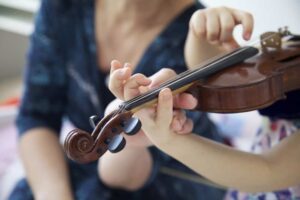 Yes, your child should play violin! My eager answer relates to a few years ago, as I watched a blind 9-year old with spasticity perform a short violin piece on stage. From that moment, I have believed that every child has the ability to play the violin – but why the violin? Science has not given specific research to the special properties of learning the violin, so my approach to this question is from a personal and observational standpoint as an Atlanta violin teacher. I learned a number of instruments growing up, but I find that learning violin provides a unique and edifying experience and here are some reasons why.
Yes, your child should play violin! My eager answer relates to a few years ago, as I watched a blind 9-year old with spasticity perform a short violin piece on stage. From that moment, I have believed that every child has the ability to play the violin – but why the violin? Science has not given specific research to the special properties of learning the violin, so my approach to this question is from a personal and observational standpoint as an Atlanta violin teacher. I learned a number of instruments growing up, but I find that learning violin provides a unique and edifying experience and here are some reasons why.
Violin’s Are Versatile
The violin sound is heard in almost every genre of music. Even though the instrument gained popularity in Europe’s classical scene, the violin can be heard playing Irish tunes, jazz improvisations, and melodies from favorite pop songs. Your child can connect to a variety of sounds, cultures, and spaces by simply playing the violin. A child might enjoy sitting in a chair and performing with a symphony orchestra, or another might prefer standing as part of an ensemble for a jazz band. Whatever form of expression your child prefers is quite possible to explore with violin playing, and trust me, I have heard rock violinists as well doing some amazing things on stage.
Violin’s Provide Musical Opportunity
Playing the violin is a gateway to many experiences because of the numerous opportunities provided for the instrument. The violin section has not one but two sections in an orchestra, making it the largest in the ensemble. Oftentimes for chamber music, more than one violinist is needed. For any ensemble setting, violins can replace a variety of missing parts such as flute, trumpet, oboe, or viola. The avenues violin playing can offer your child leave little room for boredom and more ways to thrive and excel. Lessons play a crucial role in capitalizing on these opportunities and taking advantage of what is provided helps each child see the fruit of their labor.
Violin’s Are Welcome In The Music Community
To this day, I have a supportive group of friends, teachers, and mentors that I met from my earliest years of playing violin. The versatility and opportunity that comes along with violin playing will provide your child with life-long companions who share mutual interests and will give a healthy challenge for practicing and socializing. One major note is that the violin is portable, and carrying this instrument in various spaces has helped me connect with many different people.
Learning Violin Produces Character
The intricate nature of violin playing is one that requires diligence and determination. Unlike learning the piano, the sound is not as smooth and clear when one first begins to play, but commitment to the technique and openness to the process of learning the violin ennobles a child’s character. The process of learning violin helped me learn maturity and patience. Even though character development occurs in the process of learning any instrument, the dominance that can accompany the violin – whether playing in the biggest section of an orchestra or standing versus sitting for a solo performance – requests a practice of humility as well. Imagine your child learning to be a better person as they excel as a musician! Seeing the young student with spasticity play on stage successfully, I know he was a testament to his parents providing him an opportunity to achieve something special.
The First Step
Lessons In Your Home helps provide an opportunity for your child to learn violin in a personalized way right in your home and opens a window for the versatility, community, and character development you and your child can explore. Virtual music lessons and private in-home lessons are offered and more information can be found here. I continue to look forward to the growth of curious students joining the violin world!
By: Danya Wilson, a Lessons In Your Home Atlanta Violin Teacher
